June 19, 2025 | 15:02 GMT +7
June 19, 2025 | 15:02 GMT +7
Hotline: 0913.378.918
June 19, 2025 | 15:02 GMT +7
Hotline: 0913.378.918
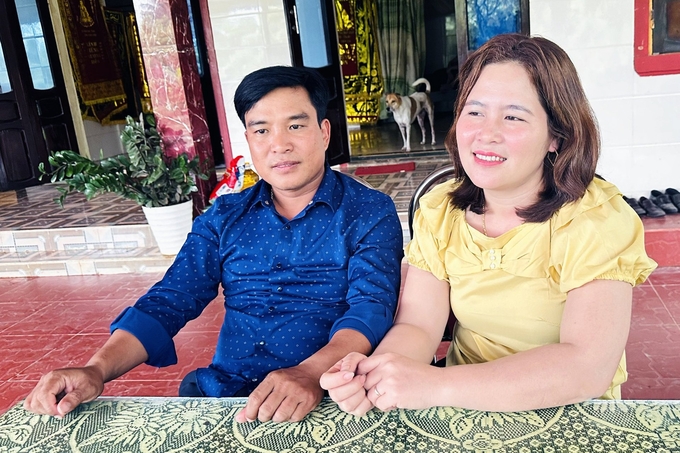
"Hai Lua" Vinh Lam - Nguyen Van Tuan and his wife share the story of organic rice cultivation. Photo: Vo Dung.
Heading south to escape the relentless toil of manual labor and a hardscrabble existence, Mr. Nguyen Van Tuan from Tien My 2 village, Vinh Lam commune, Vinh Linh district, Quang Tri province, found his way back to the rice fields to start a new entrepreneurial journey. Despite expectations that he would leave the agricultural life behind, Mr. Tuan started cultivating an impressive 8 hectares of rice paddies, which is a dream that many could only aspire to.
As the organic rice production movement gained momentum in Quang Tri province starting in 2018, Mr. Tuan and his wife drove to Dong Ha city to meet with Mr. Ho Xuan Hieu, Chairman of the Board of Directors of Quang Tri General Trading JSC (Sepon Group) with the goal of establishing a partnership for ST25 organic rice production. After assessing the suitability of the production area, Sepon Group decided to collaborate with Mr. Tuan and conducted a 0.5-hectare organic rice trial over two crops. This partnership marked the land's reformation, detoxification, and nutrient enrichment before transitioning to organic rice production. By 2019, Mr. Tuan and his wife met all the requirements for official organic rice production on their 0.5-hectare land.
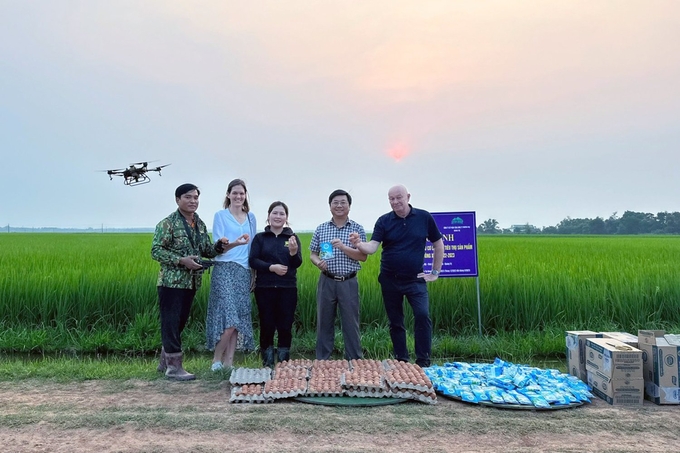
Many foreign experts have visited and surveyed organic rice fields in Quang Tri province. Photo: Vo Dung.
Although safe rice production was relatively manageable, venturing into organic rice cultivation conviced Mr. Tuan of a tranquil agricultural life. Landowners only need to prepare and level the fields, as various processes, including sowing, fertilizing, implementing biological pest control, and harvesting, were fully mechanized. The workforce of Sepon Group shouldered the majority of the aforementioned responsibilities, including rice milling. Organic straws are also rolled and directly acquired from the fields by the company.
"ST25 organic rice production requires sparse sowing in order to reduce the risk of diseases. All of the production stages, from sowing to cultivation, and harvesting, are fully mechanized. As a result, farmers can comfortably sell fresh rice directly from the fields to Sepon Group at the contract price of 12,000 VND per kilogram," Mr. Tuan shared.
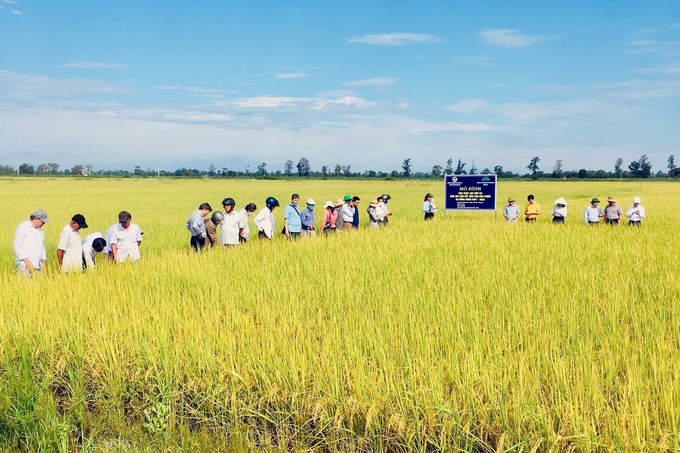
The fields that helped establish the Quang Tri organic rice brand. Photo: Vo Dung.
The yield of ST25 rice in Quang Tri province fluctuates between 6 to 6.4 tons per hectare with a prolonged growth period. However, at the field price of 12 million VND per ton of fresh rice, farmers regularly enjoy a net profit of 30 million VND per hectare per crop. Moreover, all cultivation and care processes have been mechanized, eliminating the need for constant manual labor in the fields.
With a total of 8 hectares dedicated to safe and organic rice production, Mr. Tuan's family earns a net profit of over 200 million VND per year. Their substantial income from organic rice production has allowed them to purchase a car, tractor, harvester, unmanned aerial spraying drone among other luxurious items.
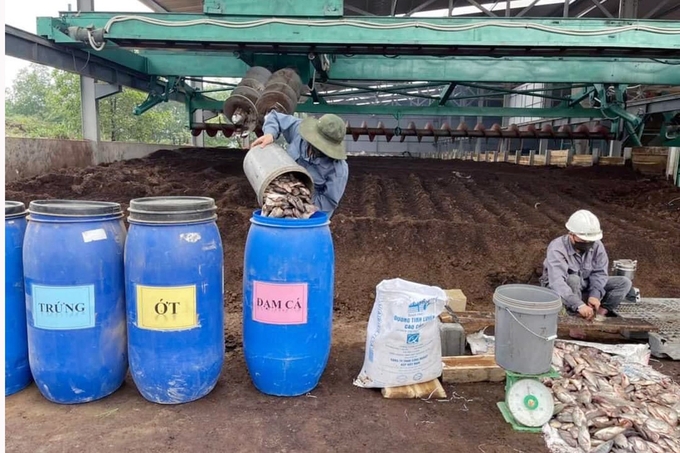
A strict rice cultivation and care process can produce high-quality products suitable for export. Photo: Vo Dung.
Starting from the 2023-2024 winter-spring crop, the entire 8-hectare land owned by Mr. Tuan's family will transition to organic rice production. Mr. Tuan and his wife were inspired by the fact that farmers can thrive on their own fields as well as contribute to environmental preservation. The organic rice production approach allows both profits and benefits to coexist harmoniously. It serves as the driving force behind "Hai Lua" Vinh Lam to lead in encouraging fellow citizens to participate in organic rice production.
"Organic rice production results in safe products for consumers at profitable prices. It can pave the way for farmers to prosper if they manage to accumulate production land. Farmers can enjoy a relaxed agricultural life while avoiding future health risks. I recently persuaded 14 households to collaborate with Sepon Group in growing organic ST25 rice on a combined area of 9 hectares. Starting from the next crop, Tien My 2 village will cultivate 17 hectares of ST25 organic rice in collaboration with Sepon Group," Mr. Tuan enthusiastically shared.
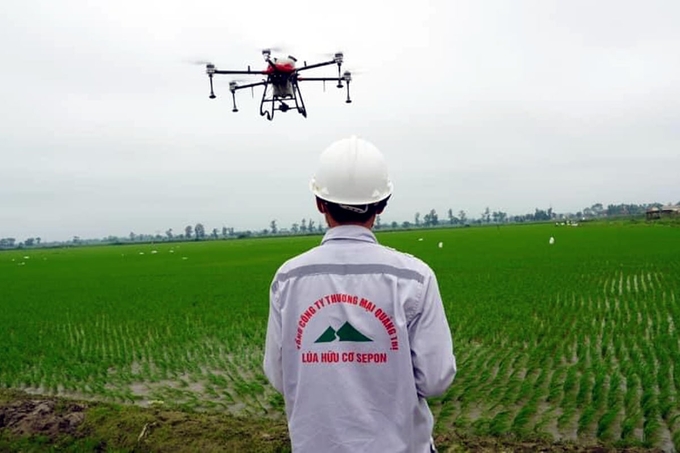
Farmers have never experienced such convenience in the process of organic rice production. Photo: Vo Dung.
Organic rice production represents a revolutionary shift where farmers must temporarily set aside their yield-oriented mindset and adhere to strict standards. The stark contrast can be challenging for farmers who are accustomed to year-round and labor-intensive production.
"Production of dry rice typically achieves a yield of 6 to 6.4 tons in this province. On the other hand, organic ST25 rice production yields approximately the same volume. As a result, farmers are hesitant to adopt this new agricultural production approach. Additionally, their fragmented fields and the transition to a market-driven production mindset poses a formidable challenge," continued Mr. Tuan.
However, the community plays a pivotal role in initiating organic rice production. Furthermore, organic rice production places input materials and output products under meticulous examination before reaching the final consumers.
"A household engaged in collaborative safe rice production with Sepon Group was apprehended by a monitoring team while in the process of applying organic compost to their fields. They were instructed to leave with a warning of potential documentation. Given the stringent demands of safe rice, every farmer understand the vital importance of strictly adhering to the cultivation process when transitioning to organic rice production," Mr. Tuan shared a story.
One farmer (who wishes to remain anonymous) were frustrated upon witnessing a group of cattle grazing on a field. Subsequently, the farmer spread a small amount of chemical fertilizer beneath the straw pile, intended for rice fertilization. When other farmers in the vicinity discovered the incident and reported it to the monitoring team, the farmer was instructed to carry the fertilizer home.
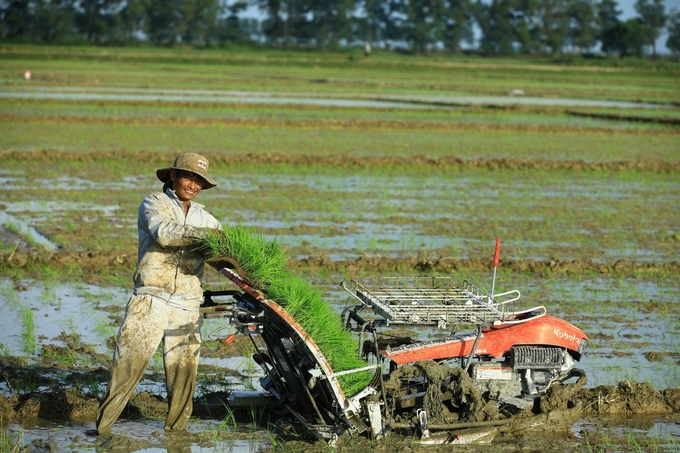
The majority of the rice cultivation and care stages are fully mechanized. Photo: Vo Dung.
"The monitoring team deducts 100,000 VND per ton of fresh rice as a fee for overseeing the rice cultivation process. Upon detection of irregularities, the monitoring provide warnings. If violations persist, we issue official reports and recommend Sepon Group to terminate the contract. Furthermore, farmers are particularly concerned about the quality of local rice products, which prompts self-monitoring within the community. This ensures that organic rice producton adheres strictly to Sepon Group's standard procedures," stated Mr. Nguyen Hai Tien, Director of the Tien My agricultural cooperative in Vinh Lam commune, and a member of the monitoring team.
Mr. Tuan explained that both organic and safe rice production in collaboration with Sepon Group are characterized by stringent care procedures, to the extent of precise specification regarding machinery to be used in production. When pests or diseases are detected, the field owner is responsible for notifying Sepon Group to dispatch unmanned aerial spraying drones for biological pest control.
Mr. Tuan is only one actor in twenty cooperatives across Quang Tri province who have collaborated with Sepon Group in organic rice production in recent years. However, ushering this transformation process in farmers' mindset has been an arduous journey for the company. The process of producing and establishing the Quang Tri organic rice brand is a slow and gradual process.
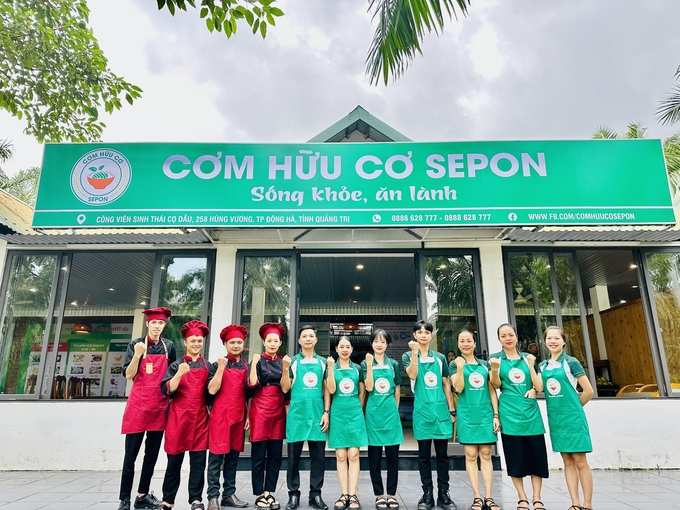
Sepon Group aims to establish a Sepon organic rice restaurant chain in all provinces and cities across Vietnam. Photo: Vo Dung.
Following several years of collaboration with the Vietnam Union of Science and Technology Associations for comprehensive surveys, Sepon Group concluded that among the 20,000 hectares of rice fields spanning across Quang Tri province, 5,000 hectares met the safety standards defined by VietGAP. Within this subset, 3,000 hectares proved suitable for organic rice production, which are predominantly situated in the districts of Trieu Phong, Hai Lang, Gio Linh, and Cam Lo.
However, engagement in organic rice production requires these regions to undergo two consecutive crops of safe rice production. The transition process includes land reformation, detoxification, and the introduction of natural nutrients into the soil. Furthermore, the water source allocated for organic rice production must follow a uni-directional path, ensuring disposal after a single usage without any form of recycling.
The endeavor to successfully trap and propagate native microorganisms for organic fertilizer production last several years starting from 2022. Subsequently, Sepon Group established collaborations with 700 households across the four districts of Hai Lang, Trieu Phong, Cam Lo, and Vinh Linh, on 410 hectares of safe and organic rice production area. This concerted effort culminated in an annual yield of 24,000 tons of fresh rice. The VietGap-compliant, safe and organic Sepon rice brand has been introduced into numerous supermarket chains supervised by Sepon Group, covering twelve provinces and cities throughout the country. Moreover, these products have met the stringent criteria for export to European markets. Nevertheless, the export of Sepon rice is, according to Mr. Ho Xuan Hieu, a plan for the future.
"We allocate 10% of the produced rice for the local farmers' consumption. According to our strategic plan, 40% of the rice will be supplied to the domestic market, and the remaining 50% will be reserved for international export. However, this is a plan for the future. The foremost priority for organic Sepon rice is to ensure that it is accessible and enjoyed by Vietnamese people," Mr. Hieu emphasized with great enthusiasm.
Healthy diet for a healthy lifestyle
Mr. Ho Xuan Hieu revealed that the company recently inaugurated an organic rice and food establishment named "Organic Sepon rice restaurant" in the Dong Ha city. This establishment exclusively employs organic and VietGAP-compliant ST25 rice and food products. Patrons at the restaurant will have the opportunity to experience and receive consultation regarding various health indicators, such as body fat percentage, water content, bone mass, biological age, etc., which are tailored to each specific individual.
Translated by Nguyen Hai Long
![Turning wind and rain into action: [9] Digitizing hydrometeorological data in response to climate change](https://t.ex-cdn.com/nongnghiepmoitruong.vn/608w/files/news/2025/06/17/z6704423696987_15fd32ffc26d590d204d520c9dac6786-nongnghiep-165943.jpg)
(VAN) Farmers have begun accessing hydrometeorological applications to adjust their cropping schedules, aiming to ensure productivity and adapt to climate change.
![Turning wind and rain into action: [8] Real-time salinity detection and early warning technology](https://t.ex-cdn.com/nongnghiepmoitruong.vn/608w/files/news/2025/06/17/z6704423696987_15fd32ffc26d590d204d520c9dac6786-nongnghiep-151127.jpg)
(VAN) Thanks to the integration of modern hydrological-hydraulic models, remote sensing technologies, and artificial intelligence, the accuracy of hydrological forecasting has significantly improved.
![Turning wind and rain into action: [7] Early disaster warnings help marine farmers minimize losses](https://t.ex-cdn.com/nongnghiepmoitruong.vn/608w/files/news/2025/06/17/z6704423696987_15fd32ffc26d590d204d520c9dac6786-nongnghiep-142942.jpg)
(VAN) In recent years, thanks to early disaster warnings and forecasting, marine farmers in Khanh Hoa province have been able to reduce risks and losses, thereby improving production efficiency.
![Turning wind and rain into action: [6] ‘Four on-the-spot’ disaster management software](https://t.ex-cdn.com/nongnghiepmoitruong.vn/608w/files/news/2025/06/17/e5a48259d6a262fc3bb3-nongnghiep-183800.jpg)
(VAN) By simply activating the scenario on the disaster management software, the relevant authorities immediately know how many households need to be evacuated, where to evacuate them to, and by what means of transportation…
![Turning wind and rain into action: [5] Hue applies modern technology in disaster forecasting](https://t.ex-cdn.com/nongnghiepmoitruong.vn/608w/files/news/2025/06/17/z6704423696987_15fd32ffc26d590d204d520c9dac6786-nongnghiep-093938.jpg)
(VAN) In Hue city, modern technology has recently been applied in meteorological and hydrological forecasting and warning, helping to reduce the damage caused by natural disasters.

(VAN) A cutting-edge farming technique being implemented on an experimental ranch in Arizona's Sonoran Desert has already saved a billion gallons of water over five years, according to Civil Eats.

(VAN) Poultry and pig production and the environment can be boosted through enhanced water technology, according to new research.